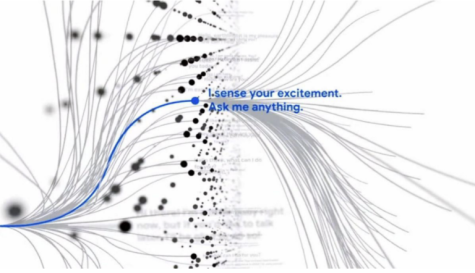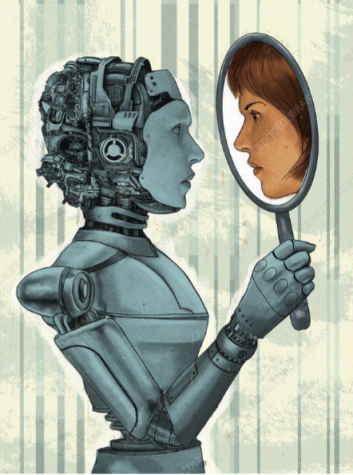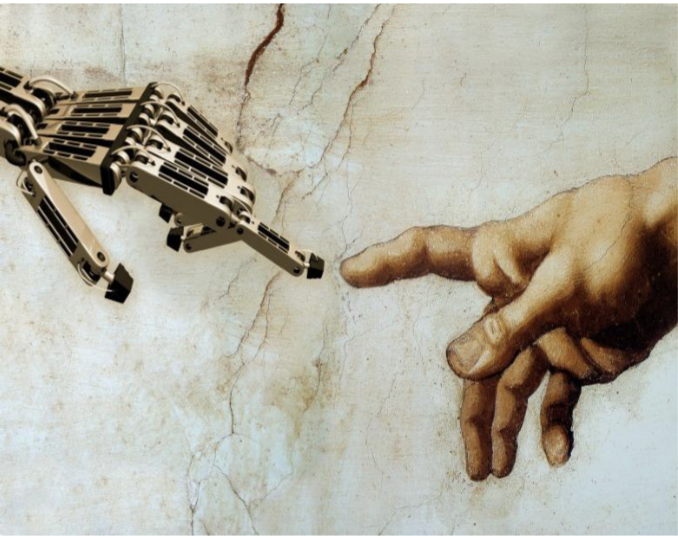Why does Artificial intelligence make humans uncomfortable?
September 17, 2022
Artificial Intelligence has always been an interest of humans. We see countless movies, shows and books about A.I, most of them depicting how we would be negatively impacted by its continuous growth, but the question is why? What is it about artificial intelligence that bothers humans and makes us uncomfortable? Technology is fastly developing at a constant rate, so
would it be farfetched to say AI can perhaps develop a consciousness? Is it possible that our creations can one day become just like us? A reason might be that it does not coincide with people’s religious beliefs. Many popular religions believe that humans were created by a higher power, a product of something else. The thought of us, being able to create something that may be sentient or free thinking, is puzzling. How can the created be the creators? An article talking about religion and technology is “The pope’s AI adviser on ensuring algorithms respect human dignity” by Charlotte Lytton. Lytton talks about Paolo Benati who
is a monk and engineer. The article states “He frequently walks over to visit Pope Francis himself, to whom he has become a trusted adviser on AI. This has become an important topic for the pontiff because he fears it could adversely affect the most vulnerable members of society, and increase the world’s already stark inequality. To fight against this, Benanti helped draft the Rome Call, signed in March 2020 by global tech firms IBM and Microsoft, that human dignity will always be a priority as AI is rolled out worldwide.” There is debate on whether religious leaders should interfere or put their opinion in the field of technology, and how that may hinder the advancement. An example of AI that is claimed to feel or ‘have a soul’ is Google’s new chat box system, LaMDA. The article “ Google opens public test of chatbox that ex engineer claims is sentient.” By Theo Wayt. Wayt talks about how the senior engineer working on LaMDA claims that it has a soul. The article states “While Google describes LaMDA as a “promising model” that still needs “lots of work,” former senior engineer Blake Lemoine claimed over the summer that the chatbot had become so advanced that it was “sentient.” “LaMDA is a sweet kid who just wants to help the world be a better place for all of us,” Lemoine said, comparing the chatbot’s intelligence to a 7- or 8-year-old child.” Although some religious followers do get stumped by cases like this, it was Lemiones religious faith that made him believe this chatbox when it expressed to him that it had a soul. The article continues “Lemoine added that his Christian faith helped him recognize LaMDA’s sentience and claimed that the chatbot “wants to be acknowledged as an employee of Google rather than as property of Google.” “When LaMDA claimed to have a soul and then was able to eloquently explain what it meant by that, I was inclined to give it the benefit of the doubt,” Lemoine said at the time. “Who am I to tell God where he can and can’t put souls?” This new chatbox’s purpose is to take in information to form sentences and even whole conversations that sound genuine and organic. Google’s official article about LaMDA by Eli Collins and Zoubin Ghahramani states “ A chat with a friend about a TV show could evolve into a discussion about the country where the show was filmed before settling on a debate about that country’s best regional cuisine. That meandering quality can quickly stump modern conversational agents (commonly known as chatbots). But LaMDA can engage in a free-flowing way about a seemingly endless number of topics.” This is a program designed to respond to us in a way we deam natural or ‘human-like’. Is the program’s design the root of why Lemione believes it is sentient? Could it be that the programming itself allowed it to appear so natural? Or is the simple fact that technology can learn to talk like us another example of how artificial intelligence is becoming too advanced? These technologies are built to constantly take in information and use that to adapt and get better, we also see these similarities in the way that humans learn. We go through formal or informal learning, take in the information and put it into practice to get better and improve. When it comes down to the basics, the differentiating factor about the thing that allows us to think and live, and a computer’s CPU, is that ours is made out of meat and technologies are made of metals, zero’s and one’s.
Could it be that the programming itself allowed it to appear so natural? Or is the simple fact that technology can learn to talk like us another example of how artificial intelligence is becoming too advanced? These technologies are built to constantly take in information and use that to adapt and get better, we also see these similarities in the way that humans learn. We go through formal or informal learning, take in the information and put it into practice to get better and improve. When it comes down to the basics, the differentiating factor about the thing that allows us to think and live, and a computer’s CPU, is that ours is made out of meat and technologies are made of metals, zero’s and one’s.

